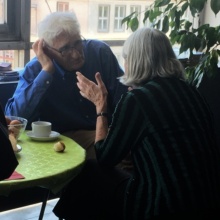Organized by André Bächtiger in collaboration with the IZKT (Internationales Zentrum für Kultur- und Technikforschung der Universität Stuttgart), the workshop aimed at clarifying longstanding conceptual issues while at the same time sketching future avenues for deliberative practice and research. The workshop was organized in connection with the forthcoming Oxford Handbook of Deliberative Democracy (eds. André Bächtiger, John Dryzek, Jane Mansbridge and Mark Warren).
Conceptual issues
A first part of the workshop was dedicated to conceptual issues. Habermas partly contested a minimal (and pluralistic) conception of deliberative democracy, defining deliberation as “mutual communication that involves weighing and reflecting on preferences, values and interests regarding matters of common concern.” (Introduction to the Handbook). According to Habermas, such a minimal definition may be “too liberal” and “individualistic”, underestimating the importance of an inclusive and intersubjectively-shared argumentative process, where participants develop consensual and binding norms together. Such an inclusive and intersubjectively-shared process, so Habermas, is essential to produce legitimacy and social integration in modern societies where a commonly shared religious or moral frame is absent.
Epistemic dimensions of deliberative democracy
A second part of the workshop focused on the epistemic dimensions of deliberative democracy. In a fascinating exchange between Jürgen Habermas and Hélène Landemore, two visions of epistemic deliberation emerged: a fully proceduralist vision of epistemic advancement, on the one hand, where participants develop epistemically better answers in the deliberative process in a “co-creative” process (Habermas); and a more procedure-independent vision of epistemic advancement, on the other hand, where “truth” is given externally and is “discovered” by the participants in the deliberative process (Landemore).
Deliberation and Framing
A final part of the workshop explored the links between deliberation and one of its main contenders in the analysis of political communication, ´framing´. While many define “framing” as the selective emphasis of political reality by strategic elite actors, deliberation is usually seen as bottom-up and authentic communicative process. Rune Slothuus argued that framing can entail normative dimensions as well: competing frames by responsible political elites can help citizens to make reasonable political choices. There was agreement that there is no “neutral” communication or deliberation: every communication is “framed”, i.e. emphasizes some aspects of reality and ignores others. Hence future research should engage in bridge-building activities between framing and deliberation.
The workshop ended with an emotional appeal by Jürgen Habermas to understand “the force of the better argument” as a key element to make democracies viable in the 21st century.


